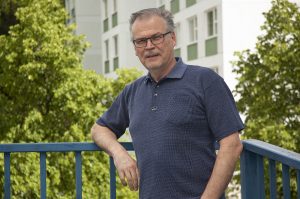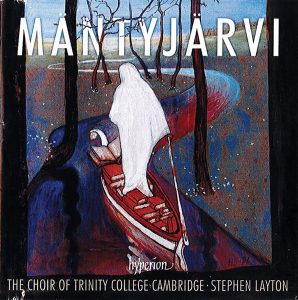Review: Jaakko Mäntyjärvi – Compositions for Chorus
Jaakko Mäntyjärvi – Compositions for Chorus
The Choir of Trinity College Cambridge, cond. Stephen Layton
(Hyperion CDA68266)
Reviewed by Reijo Kekkonen, Director of publishing at the SULASOL music publishers
At the present time, Jaakko Mäntyjärvi is considered the brightest star in Finnish choral composition. His work is widely known and is often performed around the world. Mäntyjärvi débuted as a composer in 1995 with Pseudo-Yoik, followed by a piece from his youth, Four Shakespeare Songs. These works are continually among his most popular compositions.
Few people know that Jaakko Mäntyjärvi is a professional translator by occupation. In Finland, he seems to be considered a translator who happens to write choral music, but abroad he is seen as a top composer who happens to understand languages. His international success is based not only on pleasing harmonies, but also on his talent for orchestrating text for choirs. Since he has a great deal of experience in the choral arts, he understands a choir’s different registers and how to produce different textures. An excellent example of this is the new recording by the Choir of Trinity College Cambridge, conducted by Stephen Layton.
Jaakko Mäntyjärvi’s compositions include many humorous works, such as the above-mentioned Pseudo-Yoik and El Hambo. In addition, Mäntyjärvi has composed several serious and deeply affecting pieces, like the touching Canticum Calamitatis Maritimae commemorating the victims of the 1994 Estonia shipwreck. For this recording, Stephen Layton commissioned a large work, an entire church service, then called Trinity Service. It is the main work on the CD and is accompanied by the demanding Stuttgarter Psalmen from 2009,written for the Internationale Bachakademie Stuttgart to celebrate the bicentenary of Felix Mendelssohn’s birth. These expressive compositions hint at the composer’s mastery of contemporary and dissonant elements even though he has claimed to love consonances.
Trinity Service is meant to be used at Evensong, which is a liturgical service of the Church of England and related denominations worldwide, a tradition established nearly 500 years ago. Mäntyjärvi’s setting may indeed be performed as an evensong but may also be shortened to a concert version, the one heard on the recording. With the work’s new, free tonalities, one can appreciate not only the harmonies, but also the orchestral tone colours that the composer combines with them.
In order for the harmonic colours to ring true, the work needs to be performed by a top-quality ensemble. The Choir of Trinity College Cambridge is precisely that kind of choir. Excellent voice quality and tuning make the large chords and sharp dissonances sound maturely conceived yet also crisp when needed.
The smaller works on the CD include Ave Maria d’Aosta, Benedic anima mea Domino, Pulchra es, and O magnum mysterium. Ave Maria d’Aosta is one of the four Ave Marias Mäntyjärvi has composed. It was written in 2004 in Aosta, Italy, where he was teaching a course in choral composition. Benedic anima mea Domino, from 1994, is a kind of a reinvention of medieval praxis used to vivid effect.. O magnum mysterium, from 2007, is essentially a study in low-pitched sonorities in a key in the neighbourhood of E flat, except for a brief departure toward the middle. Finally, there is Jaakko Mäntyjärvi’s wonderful new piece, Pulchra es, composed for the wedding of his son in 2018. It is a small motet, incredibly beautiful, that creates the illusion of being easy to perform. However, accuracy and sensitivity are required to do justice to this rare jewel.
This recording is an excellent starting point for getting acquainted with Mäntyjärvi’s music. Those who are already familiar with his compositions will find this CD soothing and enjoyable.
 REIJO KEKKONEN (*1961) is currently working as a director of publishing at the Sulasol music publishers (since 1988). He received a Master of Music degree (music education, violin, singing, piano, oboe) from the Sibelius Academy, in Helsinki, in 1991, with special studies in composition (Vladimir Agopov, Tapani Länsiö) and in choral conducting (Matti Hyökki, Erkki Pullinen). He has played with various orchestras and bands and has also worked as a professional singer (2nd bass) with the Finnish Radio Chamber Choir, Sibelius Academy Vocal Ensemble, and Cetus Noster, among others. Kekkonen has served as a judge in choral competitions, composition competitions, and arrangement competitions worldwide. He has held several important positions in organisations, festivals, and competitions in Finland and elsewhere.
REIJO KEKKONEN (*1961) is currently working as a director of publishing at the Sulasol music publishers (since 1988). He received a Master of Music degree (music education, violin, singing, piano, oboe) from the Sibelius Academy, in Helsinki, in 1991, with special studies in composition (Vladimir Agopov, Tapani Länsiö) and in choral conducting (Matti Hyökki, Erkki Pullinen). He has played with various orchestras and bands and has also worked as a professional singer (2nd bass) with the Finnish Radio Chamber Choir, Sibelius Academy Vocal Ensemble, and Cetus Noster, among others. Kekkonen has served as a judge in choral competitions, composition competitions, and arrangement competitions worldwide. He has held several important positions in organisations, festivals, and competitions in Finland and elsewhere.
Edited by Richard Kutner, USA
